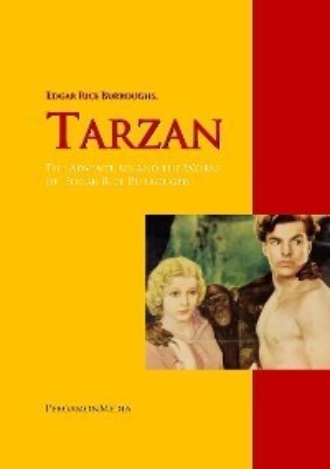
Полная версия
Tarzan: The Adventures and the Works of Edgar Rice Burroughs
He found himself in a rather spacious apartment, the floor of which was covered with rugs of barbaric design, while the few pieces of furniture were of a similar type to that which he had seen in the room on the first floor into which he and Bertha Kircher had been ushered at the conclusion of their journey. At one end of the room was what appeared to be a curtained alcove, the heavy hangings of which completely hid the interior. In the wall opposite the window and near the alcove was a closed door, apparently the only exit from the room.
He could see, in the waning light without, that the close of the day was fast approaching, and he hesitated while he deliberated the advisability of waiting until darkness had fallen, or of immediately searching for some means of escape from the building and the city. He at last decided that it would do no harm to investigate beyond the room, that he might have some idea as how best to plan his escape after dark. To this end he crossed the room toward the door but he had taken only a few steps when the hangings before the alcove separated and the figure of a woman appeared in the opening.
She was young and beautifully formed; the single drapery wound around her body from below her breasts left no detail of her symmetrical proportions unrevealed, but her face was the face of an imbecile. At sight of her Smith-Oldwick halted, momentarily expecting that his presence would elicit screams for help from her. On the contrary she came toward him smiling, and when she was close her slender, shapely fingers touched the sleeve of his torn blouse as a curious child might handle a new toy, and still with the same smile she examined him from head to foot, taking in, in childish wonderment, every detail of his apparel.
Presently she spoke to him in a soft, well-modulated voice which contrasted sharply with her facial appearance. The voice and the girlish figure harmonized perfectly and seemed to belong to each other, while the head and face were those of another creature. Smith-Oldwick could understand no word of what she said, but nevertheless he spoke to her in his own cultured tone, the effect of which upon her was evidently most gratifying, for before he realized her intentions or could prevent her she had thrown both arms about his neck and was kissing him with the utmost abandon.
The man tried to free himself from her rather surprising attentions, but she only clung more tightly to him, and suddenly, as he recalled that he had always heard that one must humor the mentally deficient, and at the same time seeing in her a possible agency of escape, he closed his eyes and returned her embraces.
It was at this juncture that the door opened and a man entered. With the sound from the first movement of the latch, Smith-Oldwick opened his eyes, but though he endeavored to disengage himself from the girl he realized that the newcomer had seen their rather compromising position. The girl, whose back was toward the door, seemed at first not to realize that someone had entered, but when she did she turned quickly and as her eyes fell upon the man whose terrible face was now distorted with an expression of hideous rage she turned, screaming, and fled toward the alcove. The Englishman, flushed and embarrassed, stood where she had left him. With the sudden realization of the futility of attempting an explanation, came that of the menacing appearance of the man, whom he now recognized as the official who had received them in the room below. The fellow's face, livid with insane rage and, possibly, jealousy, was twitching violently, accentuating the maniacal expression that it habitually wore.
For a moment he seemed paralyzed by anger, and then with a loud shriek that rose into an uncanny wail, he drew his curved saber and sprang toward the Englishman. To Smith-Oldwick there seemed no possible hope of escaping the keen-edged weapon in the hands of the infuriated man, and though he felt assured that it would draw down upon him an equally sudden and possibly more terrible death, he did the only thing that remained for him to do—drew his pistol and fired straight for the heart of the oncoming man. Without even so much as a groan the fellow lunged forward upon the floor at Smith-Oldwick's feet—killed instantly with a bullet through the heart. For several seconds the silence of the tomb reigned in the apartment.
The Englishman, standing over the prostrate figure of the dead man, watched the door with drawn weapon, expecting momentarily to hear the rush of feet of those whom he was sure would immediately investigate the report of the pistol. But no sounds came from below to indicate that anyone there had heard the explosion, and presently the man's attention was distracted from the door to the alcove, between the hangings of which the face of the girl appeared. The eyes were widely dilated and the lower jaw dropped in an expression of surprise and awe.
The girl's gaze was riveted upon the figure upon the floor, and presently she crept stealthily into the room and tiptoed toward the corpse. She appeared as though constantly poised for flight, and when she had come to within two or three feet of the body she stopped and, looking up at Smith-Oldwick, voiced some interrogation which he could not, of course, understand. Then she came close to the side of the dead man and kneeling upon the floor felt gingerly of the body.
Presently she shook the corpse by the shoulder, and then with a show of strength which her tenderly girlish form belied, she turned the body over on its back. If she had been in doubt before, one glance at the hideous features set in death must have convinced her that life was extinct, and with the realization there broke from her lips peal after peal of mad, maniacal laughter as with her little hands she beat upon the upturned face and breast of the dead man. It was a gruesome sight from which the Englishman involuntarily drew back—a gruesome, disgusting sight such as, he realized, might never be witnessed outside a madhouse or this frightful city.
In the midst of her frenzied rejoicing at the death of the man, and Smith-Oldwick could attribute her actions to no other cause, she suddenly desisted from her futile attacks upon the insensate flesh and, leaping to her feet, ran quickly to the door, where she shot a wooden bolt into its socket, thus securing them from interference from without. Then she returned to the center of the room and spoke rapidly to the Englishman, gesturing occasionally toward the body of the slain man. When he could not understand, she presently became provoked and in a sudden hysteria of madness she rushed forward as though to strike the Englishman. Smith-Oldwick dropped back a few steps and leveled his pistol upon her. Mad though she must have been, she evidently was not so mad but what she had connected the loud report, the diminutive weapon, and the sudden death of the man in whose house she dwelt, for she instantly desisted and quite as suddenly as it had come upon her, her homicidal mood departed.
Again the vacuous, imbecile smile took possession of her features, and her voice, dropping its harshness, resumed the soft, well-modulated tones with which she had first addressed him. Now she attempted by signs to indicate her wishes, and motioning Smith-Oldwick to follow her she went to the hangings and opening them disclosed the alcove. It was rather more than an alcove, being a fair-sized room heavy with rugs and hangings and soft, pillowed couches. Turning at the entrance she pointed to the corpse upon the floor of the outer room, and then crossing the alcove she raised some draperies which covered a couch and fell to the floor upon all sides, disclosing an opening beneath the furniture.
To this opening she pointed and then again to the corpse, indicating plainly to the Englishman that it was her desire that the body be hidden here. But if he had been in doubt, she essayed to dispel it by grasping his sleeve and urging him in the direction of the body which the two of them then lifted and half carried and half dragged into the alcove. At first they encountered some difficulty when they endeavored to force the body of the man into the small space she had selected for it, but eventually they succeeded in doing so. Smith-Oldwick was again impressed by the fiendish brutality of the girl. In the center of the room lay a blood-stained rug which the girl quickly gathered up and draped over a piece of furniture in such a way that the stain was hidden. By rearranging the other rugs and by bringing one from the alcove she restored the room to order so no outward indication of the tragedy so recently enacted there was apparent.
These things attended to, and the hangings draped once more about the couch that they might hide the gruesome thing beneath, the girl once more threw her arms about the Englishman's neck and dragged him toward the soft and luxurious pillows above the dead man. Acutely conscious of the horror of his position, filled with loathing, disgust, and an outraged sense of decency, Smith-Oldwick was also acutely alive to the demands of self-preservation. He felt that he was warranted in buying his life at almost any price; but there was a point at which his finer nature rebelled.
It was at this juncture that a loud knock sounded upon the door of the outer room. Springing from the couch, the girl seized the man by the arm and dragged him after her to the wall close by the head of the couch. Here she drew back one of the hangings, revealing a little niche behind, into which she shoved the Englishman and dropped the hangings before him, effectually hiding him from observation from the rooms beyond.
He heard her cross the alcove to the door of the outer room, and heard the bolt withdrawn followed by the voice of a man mingled with that of the girl. The tones of both seemed rational so that he might have been listening to an ordinary conversation in some foreign tongue. Yet with the gruesome experiences of the day behind him, he could not but momentarily expect some insane outbreak from beyond the hangings.
He was aware from the sounds that the two had entered the alcove, and, prompted by a desire to know what manner of man he might next have to contend with, he slightly parted the heavy folds that hid the two from his view and looking out saw them sitting on the couch with their arms about each other, the girl with the same expressionless smile upon her face that she had vouchsafed him. He found he could so arrange the hangings that a very narrow slit between two of them permitted him to watch the actions of those in the alcove without revealing himself or increasing his liability of detection.
He saw the girl lavishing her kisses upon the newcomer, a much younger man than he whom Smith-Oldwick had dispatched. Presently the girl disengaged herself from the embrace of her lover as though struck by a sudden memory. Her brows puckered as in labored thought and then with a startled expression, she threw a glance backward toward the hidden niche where the Englishman stood, after which she whispered rapidly to her companion, occasionally jerking her head in the direction of the niche and on several occasions making a move with one hand and forefinger, which Smith-Oldwick could not mistake as other than an attempt to describe his pistol and its use.
It was evident then to him that she was betraying him, and without further loss of time he turned his back toward the hangings and commenced a rapid examination of his hiding place. In the alcove the man and the girl whispered, and then cautiously and with great stealth, the man rose and drew his curved saber. On tiptoe he approached the hangings, the girl creeping at his side. Neither spoke now, nor was there any sound in the room as the girl sprang forward and with outstretched arm and pointing finger indicated a point upon the curtain at the height of a man's breast. Then she stepped to one side, and her companion, raising his blade to a horizontal position, lunged suddenly forward and with the full weight of his body and his right arm, drove the sharp point through the hangings and into the niche behind for its full length.
Bertha Kircher, finding her struggles futile and realizing that she must conserve her strength for some chance opportunity of escape, desisted from her efforts to break from the grasp of Prince Metak as the fellow fled with her through the dimly lighted corridors of the palace. Through many chambers the prince fled, bearing his prize. It was evident to the girl that, though her captor was the king's son, he was not above capture and punishment for his deeds, as otherwise he would not have shown such evident anxiety to escape with her, as well as from the results of his act.
From the fact that he was constantly turning affrighted eyes behind them, and glancing suspiciously into every nook and corner that they passed, she guessed that the prince's punishment might be both speedy and terrible were he caught.
She knew from their route that they must have doubled back several times although she had quite lost all sense of direction; but she did not know that the prince was as equally confused as she, and that really he was running in an aimless, erratic manner, hoping that he might stumble eventually upon a place of refuge.
Nor is it to be wondered at that this offspring of maniacs should have difficulty in orienting himself in the winding mazes of a palace designed by maniacs for a maniac king. Now a corridor turned gradually and almost imperceptibly in a new direction, again one doubled back upon and crossed itself; here the floor rose gradually to the level of another story, or again there might be a spiral stairway down which the mad prince rushed dizzily with his burden. Upon what floor they were or in what part of the palace even Metak had no idea until, halting abruptly at a closed door, he pushed it open to step into a brilliantly lighted chamber filled with warriors, at one end of which sat the king upon a great throne; beside this, to the girl's surprise, she saw another throne where was seated a huge lioness, recalling to her the words of Xanila which, at the time, had made no impression on her: "But he had many other queens, nor were they all human."
At sight of Metak and the girl, the king rose from his throne and started across the chamber, all semblance of royalty vanishing in the maniac's uncontrollable passion. And as he came he shrieked orders and commands at the top of his voice. No sooner had Metak so unwarily opened the door to this hornets' nest than he immediately withdrew and, turning, fled again in a new direction. But now a hundred men were close upon his heels, laughing, shrieking, and possibly cursing. He dodged hither and thither, distancing them for several minutes until, at the bottom of a long runway that inclined steeply downward from a higher level, he burst into a subterranean apartment lighted by many flares.
In the center of the room was a pool of considerable size, the level of the water being but a few inches below the floor. Those behind the fleeing prince and his captive entered the chamber in time to see Metak leap into the water with the girl and disappear beneath the surface taking his captive with him, nor, though they waited excitedly around the rim of the pool, did either of the two again emerge.
When Smith-Oldwick turned to investigate his hiding place, his hands, groping upon the rear wall, immediately came in contact with the wooden panels of a door and a bolt such as that which secured the door of the outer room. Cautiously and silently drawing the wooden bar he pushed gently against the panel to find that the door swung easily and noiselessly outward into utter darkness. Moving carefully and feeling forward for each step he passed out of the niche, closing the door behind him.
Feeling about, he discovered that he was in a narrow corridor which he followed cautiously for a few yards to be brought up suddenly by what appeared to be a ladder across the passageway. He felt of the obstruction carefully with his hands until he was assured that it was indeed a ladder and that a solid wall was just beyond it, ending the corridor. Therefore, as he could not go forward and as the ladder ended at the floor upon which he stood, and as he did not care to retrace his steps, there was no alternative but to climb upward, and this he did, his pistol ready in a side pocket of his blouse.
He had ascended but two or three rungs when his head came suddenly and painfully in contact with a hard surface above him. Groping about with one hand over his head he discovered that the obstacle seemed to be the covering to a trap door in the ceiling which, with a little effort, he succeeded in raising a couple of inches, revealing through the cracks the stars of a clear African night.
With a sigh of relief, but with unabated caution, he gently slid the trapdoor to one side far enough to permit him to raise his eyes above the level of the roof. A quick glance assured him that there was none near enough to observe his movements, nor, in fact, as far as he could see, was anyone in sight.
Drawing himself quickly through the aperture he replaced the cover and endeavored to regain his bearings. Directly to the south of him the low roof he stood upon adjoined a much loftier portion of the building, which rose several stories above his head. A few yards to the west he could see the flickering light of the flares of a winding street, and toward this he made his way.
From the edge of the roof he looked down upon the night life of the mad city. He saw men and women and children and lions, and of all that he saw it was quite evident to him that only the lions were sane. With the aid of the stars he easily picked out the points of the compass, and following carefully in his memory the steps that had led him into the city and to the roof upon which he now stood, he knew that the thoroughfare upon which he looked was the same along which he and Bertha Kircher had been led as prisoners earlier in the day.
If he could reach this he might be able to pass undetected in the shadows of the arcade to the city gate. He had already given up as futile the thought of seeking out the girl and attempting to succor her, for he knew that alone and with the few remaining rounds of ammunition he possessed, he could do nothing against this city-full of armed men. That he could live to cross the lion-infested forest beyond the city was doubtful, and having, by some miracle, won to the desert beyond, his fate would be certainly sealed; but yet he was consumed with but one desire—to leave behind him as far as possible this horrid city of maniacs.
He saw that the roofs rose to the same level as that upon which he stood unbroken to the north to the next street intersection. Directly below him was a flare. To reach the pavement in safety it was necessary that he find as dark a portion of the avenue as possible. And so he sought along the edge of the roofs for a place where he might descend in comparative concealment.
He had proceeded some little way beyond a point where the street curved abruptly to the east before he discovered a location sufficiently to his liking. But even here he was compelled to wait a considerable time for a satisfactory moment for his descent, which he had decided to make down one of the pillars of the arcade. Each time he prepared to lower himself over the edge of the roofs, footsteps approaching in one direction or another deterred him until at last he had almost come to the conclusion that he would have to wait for the entire city to sleep before continuing his flight.
But finally came a moment which he felt propitious and though with inward qualms, it was with outward calm that he commenced the descent to the street below.
When at last he stood beneath the arcade he was congratulating himself upon the success that had attended his efforts up to this point when, at a slight sound behind him, he turned to see a tall figure in the yellow tunic of a warrior confronting him.
Chapter XXII
Out of the Niche
Numa, the lion, growled futilely in baffled rage as he slipped back to the ground at the foot of the wall after his unsuccessful attempt to drag down the fleeing ape-man. He poised to make a second effort to follow his escaping quarry when his nose picked up a hitherto unnoticed quality in the scent spoor of his intended prey. Sniffing at the ground that Tarzan's feet had barely touched, Numa's growl changed to a low whine, for he had recognized the scent spoor of the man-thing that had rescued him from the pit of the Wamabos.
What thoughts passed through that massive head? Who may say? But now there was no indication of baffled rage as the great lion turned and moved majestically eastward along the wall. At the eastern end of the city he turned toward the south, continuing his way to the south side of the wall along which were the pens and corrals where the herbivorous flocks were fattened for the herds of domesticated lions within the city. The great black lions of the forest fed with almost equal impartiality upon the flesh of the grass-eaters and man. Like Numa of the pit they occasionally made excursions across the desert to the fertile valley of the Wamabos, but principally they took their toll of meat from the herds of the walled city of Herog, the mad king, or seized upon some of his luckless subjects.
Numa of the pit was in some respects an exception to the rule which guided his fellows of the forest in that as a cub he had been trapped and carried into the city, where he was kept for breeding purposes, only to escape in his second year. They had tried to teach him in the city of maniacs that he must not eat the flesh of man, and the result of their schooling was that only when aroused to anger or upon that one occasion that he had been impelled by the pangs of hunger, did he ever attack man.
The animal corrals of the maniacs are protected by an outer wall or palisade of upright logs, the lower ends of which are imbedded in the ground, the logs themselves being placed as close together as possible and further reinforced and bound together by withes. At intervals there are gates through which the flocks are turned on to the grazing land south of the city during the daytime. It is at such times that the black lions of the forest take their greatest toll from the herds, and it is infrequent that a lion attempts to enter the corrals at night. But Numa of the pit, having scented the spoor of his benefactor, was minded again to pass into the walled city, and with that idea in his cunning brain he crept stealthily along the outer side of the palisade, testing each gateway with a padded foot until at last he discovered one which seemed insecurely fastened. Lowering his great head he pressed against the gate, surging forward with all the weight of his huge body and the strength of his giant sinews—one mighty effort and Numa was within the corral.
The enclosure contained a herd of goats which immediately upon the advent of the carnivore started a mad stampede to the opposite end of the corral which was bounded by the south wall of the city. Numa had been within such a corral as this before, so that he knew that somewhere in the wall was a small door through which the goatherd might pass from the city to his flock; toward this door he made his way, whether by plan or accident it is difficult to say, though in the light of ensuing events it seems possible that the former was the case.
To reach the gate he must pass directly through the herd which had huddled affrightedly close to the opening so that once again there was a furious rush of hoofs as Numa strode quickly to the side of the portal. If Numa had planned, he had planned well, for scarcely had he reached his position when the door opened and a herder's head was projected into the enclosure, the fellow evidently seeking an explanation of the disturbance among his flock. Possibly he discovered the cause of the commotion, but it is doubtful, for it was dark and the great, taloned paw that reached up and struck downward a mighty blow that almost severed his head from his body, moved so quickly and silently that the man was dead within a fraction of a second from the moment that he opened the door, and then Numa, knowing now his way, passed through the wall into the dimly lighted streets of the city beyond.
Smith-Oldwick's first thought when he was accosted by the figure in the yellow tunic of a soldier was to shoot the man dead and trust to his legs and the dimly lighted, winding streets to permit his escape, for he knew that to be accosted was equivalent to recapture since no inhabitant of this weird city but would recognize him as an alien. It would be a simple thing to shoot the man from the pocket where the pistol lay without drawing the weapon, and with this purpose in mind the Englishman slipped his hands into the side pocket of his blouse, but simultaneously with this action his wrist was seized in a powerful grasp and a low voice whispered in English: "Lieutenant, it is I, Tarzan of the Apes."






